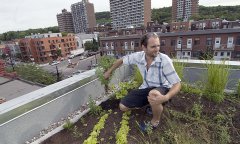
Enlarge this image
Every day, 19,000 workers ferry produce around the Central de Abastos on dollies and wheelbarrows. Marian Carrasquero for NPR hide caption
toggle caption Marian Carrasquero for NPR
Every day, 19,000 workers ferry produce around the Central de Abastos on dollies and wheelbarrows.
Marian Carrasquero for NPRMEXICO CITY — The Central de Abastos, with more than half a million daily visitors, feels more like a city than a market. Stretching across 800 acres on the eastern side of the Mexican metropolis, this wholesale produce market is the machine that feeds tens of millions of people every day.
It is also a huge source of food waste, with hundreds of tons of unsold vegetables and fruit consigned to dumpsters at the close of each market day. But since 2020, the government-run Central de Abastos has pioneered an approach to redirecting some of that unused produce into the mouths of the hungry — a program that has contributed to reducing the market's daily food waste by 24% and delivered almost 800 tons of food to soup kitchens.

NPR's Climate Week: A Search For Solutions Want to fight climate change and food waste? One app can do both
From the early hours of dawn, this wholesale bazaar is a hive of activity as buyers from markets far and wide come to select produce for the day's business. Walking around the market can be hazardous, as 19,000 workers race dollies and wheelbarrows loaded with crates between produce stands and trucks.
"Thirty to 40,000 tons of food is sold here daily," says Graciela de Paz Fuentes, the director of innovation and projects at the market for Mexico City's government. "Products arrive from every state in Mexico and 15 to 20 countries. ... It supplies 356 public markets and over 900 roving markets, as well as countless mom-and-pop shops across the metropolitan area."

Enlarge this image
Graciela de Paz Fuentes has overseen a handful of projects to make the Mexico City market more environmentally friendly. "We're trying to foster a culture of sustainability and donation," she says. Marian Carrasquero for NPR hide caption
toggle caption Marian Carrasquero for NPR
Graciela de Paz Fuentes has overseen a handful of projects to make the Mexico City market more environmentally friendly. "We're trying to foster a culture of sustainability and donation," she says.
Marian Carrasquero for NPRThis food hub also shines a spotlight on a major problem for Mexico and the world: food waste. In 2019, Mexico City officials estimated 565 tons of organic waste — everything from overripe fruit to onion skins and cut flower stems — ended up in dumpsters in the parking lots behind the Central de Abastos' beautiful produce displays every day. Government programs, including the soup kitchen donation program, lowered that total to 428 tons per day in 2022.

Enlarge this image
Along every aisle of the Central de Abastos, dumpsters fill with organic waste. In 2019, the market generated 565 tons of waste a day. Last year, that total was cut to 428 tons per day. Marian Carrasquero for NPR hide caption
toggle caption Marian Carrasquero for NPR













